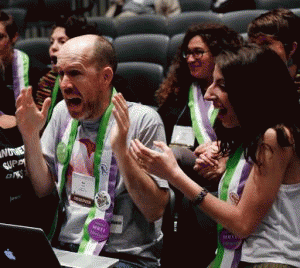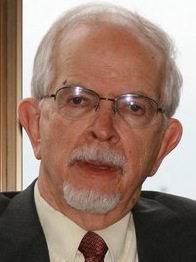Cross-posted from Wallwritings

Observer Robert Ross, reacting as the final divestment victory vote is posted
(Image by New York Times) Details DMCA
In their 221st biennial General Assembly Friday, PCUSA commissioners (delegates) voted 310-303 to divest all financial involvement in three U.S. corporations whose products are used to enforce Israel's occupation: Hewlett Packard, Motorola and Caterpillar.
Hewlett Packard manufactures eye and face scanning devices used at Israeli checkpoints, Motorola provides communications facilities within the occupied areas; while Caterpillar makes bulldozers used by Israeli authorities to destroy Palestinian homes.
The removal of PCUSA investments in those firms will neither end the occupation nor change Israel's tactics over a captive population. Total PCUSA investment in these firms is but a tiny portion of the Israeli military budget, a substantial amount of which is derived from annual U.S. gifts and loans.
The vote was not about the money; it was a moral vote against the occupation.
Through their divestment vote, U.S. Presbyterians are telling Israel, we do not support your occupation, no matter how hard you try to incorrectly shape the conversation as anti-Israel and anti-Hewlett Packard, Motorola and Caterpillar.
What will be the impact of the vote on U.S. public opinion? As with most major changes in history, the impact is usually incremental. This vote was a small vote for humankind, a vote that should be remembered the way the 1833 vote taken in the British Parliament to end the slave trade, is remembered.
Christian evangelical William Wilberforce was a leader in the fight against slavery through much of his life. He was fighting against a strongly-entrenched economic system that profited from the slave trade... Here is one account of that British Parliament vote:
"Despite the groundswell of public opinion, Parliament still refused to ban slavery, until parliamentary reform removed many of its supporters. Despite this, it was still not clear that Parliament would act. Wilberforce wrote a last petition. The Parliamentary debate lasted three months.
"On the 26th July, 1833, the Abolition of Slavery bill passed its third reading in the House of Commons. A messenger rushed to Wilberforce's house. They told him that slavery in British colonies would finally be abolished. Just three days later, on 29th July, William Wilberforce died."
Other denominations now have the Presbyterians as a moral bellwether. If they pay attention, they have also seen the Israeli narrative playbook in operation.
With approximately 1.76 million members in 2013, the PCUSA is the third largest denomination among the seven major U.S. mainline churches.
The largest denomination among the Big Seven is the United Methodist Church (UMC), which reported almost 8 million U.S. members in 2008. Anti-occupation UMC forces recently achieved a major divestment victory when its Pension Board withdrew church funds from G4S, a British firm that supplies equipment for use in Israeli prisons housing Palestinian prisoners.
Word on the church "street" is that the UMC is gearing up for its own divestment battle at its 2016 General Conference. The results of the USPCS vote should encourage Methodist anti-occupation leaders to prepare from their own exit from the immoral occupation business.
The Methodists can expect to encounter the same playbook in 2016 that the anti-divestment forces used in the PCUSA General Assembly.
That playbook may well have contributed to the narrowness of the Presbyterian vote Friday. The New York Times story at the end of the 2012 General Assembly in Pittsburg, PA, echoes stories that swept through the media this year after the 2014 vote.
(Note: You can view every article as one long page if you sign up as an Advocate Member, or higher).





